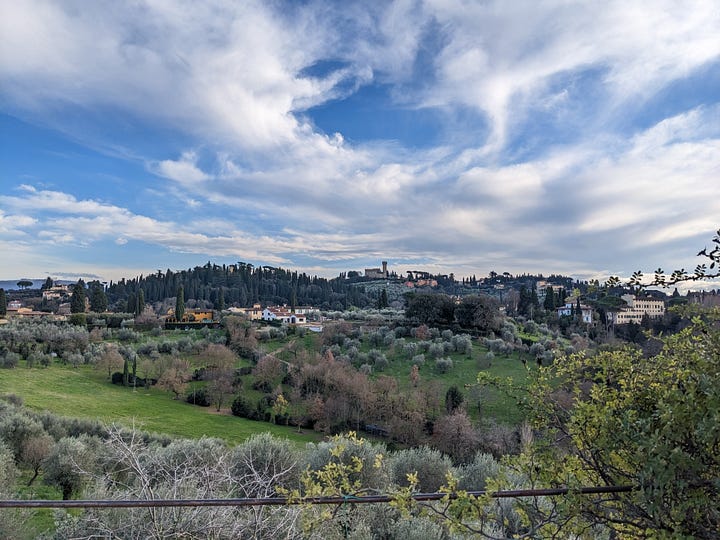Unpopular thoughts on encouragement
Florence and patrons vs patronization
I had never sketched a castle before, much less a castle in Florence. But when you go to the place where creative people with patrons did artistic things, a person will wonder what on earth they’ve been doing with their life. And they will start attempting artistic things. No one told me this, and I didn’t even know it myself, until I sat in the upper echelons of the Boboli Gardens on an insultingly cold January day. The hillside opposite me, complete with castle atop, simply begged for sketching, and by me, on that day.
It—my sketch—was crude, and I’m not just being modest. But I adored it and that I could use THESE FINGERS (holds up the five, numb fingers of my right hand) to try to recreate the beauty I saw. This was the day when I discovered my latent love of sketching, and not because I’m good at it.


Fast forward several months to when I shared one of my idea sketches on Substack. We’ve established that I’m not a sketch artist worthy of an art patron, Florentino or otherwise. I knew this, and the whole point of the simple line drawing was to illustrate a principle. It accomplished this rather nicely, if I do say so myself. Others concurred.
Not Maureen.
Maureen—this may or may not be her actual name—held a contrary opinion. What made it worse is that she combined her art critique with unsolicited, and unwelcome, encouragement.
“This looks like a child’s drawing. But keep going!” These nine, public words from a stranger on the Internet struck a dumb nerve for multiple reasons which I plan to tell you all about. Not so much that I wasn’t able to (mostly) laugh them off, but still.
Firstly, she missed that the sketch was meant to illustrate an abstract concept. There’s a guy on the World Wide Web who charges—not exaggerating—$100 for DIGITAL COPIES of his idea sketches, and they are not much more refined than mine. He’s become somewhat famous. And loads of people buy his sketches and hang framed copies on the walls of their offices. Please tell Maureen.
Secondly, I was not remotely soliciting stamp-of-approval encouragement from her—or anyone else—with my post, or really anything I share. Are we writers indescribably grateful for our readers? Yes we are. Do we welcome things like appreciation and laughs and even recognition? All day long. What we appreciate less is the brand of encouragement that seems to be in vogue these days.
At an event several months ago, I greeted a friend of a friend. Given that our mutual friend adores her, I was thrilled to meet this woman. After a few pleasantries, she asked the dreaded question, “So, where are you living these days?”
I say “dreaded” because I had spent the previous two years perplexing people with my answer to this question. It ranked low on my list of Favorite Questions to Answer. But for the first time in years, I had an easy-button answer. With relief, I said, “I’ve actually been traveling for the past couple years, and just rented a place for at least the year in Saratoga Springs.” Sure, I could’ve just answered with my city name, but everyone knows that’s a conversational killer.
“Good for you,” she responded, nodding and smiling as she said it. And then repeated it. Taken aback, I think I accidentally laughed in surprise. Which part exactly did she think was good for me? As I am wont to do on some days, I probably misunderstood her tone. It’s just that her response would’ve felt more fitting if I told her I’d given up illicit drugs, moved out of my parent’s basement, and had gotten my first job after 14 years of hard living.
Even a nonplussed response such as, “Oh, that’s cool,” or launching into a story about her upcoming travel plans would’ve prevented you and I from even talking about this. But that’s not what happened, and here we are.
At this point, I can just hear rebuttals: “Oh, she was just being nice” or “You’re being too sensitive.” Both are very likely true, but I’m the one writing this and I get to have my own opinion and you’ve just got to admit it was a funny response. And suddenly it’s like we’re doing sibling therapy on the couch. I digress.
A third data point to really round out this very important piece: On many Substack posts—my own and others—well-meaning strangers and even Substack acquaintances can be quick to praise or encourage when none was actually requested. “That’s wonderful” or anything in the neighborhood of advice seems innocuous but IS IT? I’d much prefer for a reader or friend to share that they liked something I wrote, that it made them think of such-and-such experience, or that it made them laugh or feel seen, than to be patted on the head with unsolicited approval. These “stamps of approval” wreck the Party of Human Connection I’m going for over here, plus they’ve got to be exhausting to hand out.
While we’re on the subject, might we also consider retiring the habit of turning someone else’s words or experiences into a saccharine life lesson when they didn’t do it first? THANK YOU. Too often, it and the encouragement we’ve been talking about come across as patronization—something we would tolerate much better if it came with the perks of the centuries-old practice.
Case in point: If any unsolicited encouragers want to pay for our rooms in the Florentine castle, buy all our fancy tunics, fund European travels, and sponsor our creative ventures, we’d heartily grant them permission to “encourage” us to their heart’s content. While we’re on the subject, Maureen, if you’re reading this, have you ever been interested in a patronage situation? Maybe we could visit Florence together.
Isn’t life cool, and aren’t people interesting? I’ll see you in the next one…
P.S. Soliciting all your best “encouraging” comments like, “How wonderful, Emily!” or “You’re so brave for writing this!” Any other comments are welcome as well ;-)




...have you ever been interested in a patronage situation? (Brought a snicker.)
So many questions come to mind from your answer to Maureen’s question. I was fascinated! What drew you to Saratoga Springs? What preceded it? What have you loved from your experiences? What have you learned? Can you tell I love questions? So many people simply do not know what to say and out comes words that are meaningless. I might be tempted to give Maureen the benefit of the doubt, but no.
I believe encouragement is good when it is heart-felt and done with positive intent. Maureen preceded hers with a belittling comment, which tainted her encouragement. It has the ring of falseness which never feels good.
Thank you for the thought-provoking post, Emily!